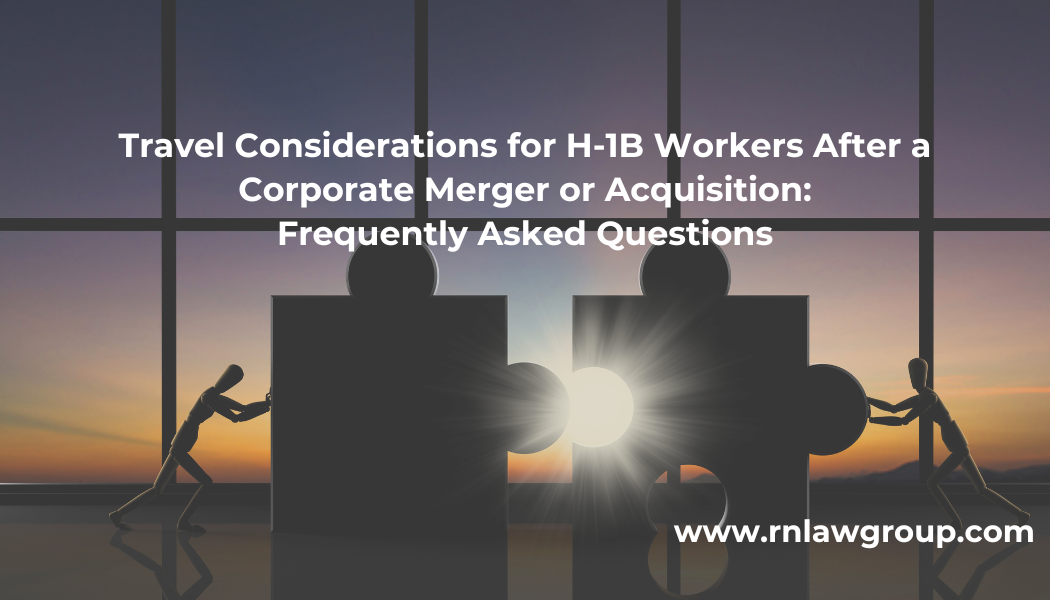
Travel Considerations for H-1B Workers After a Corporate Merger or Acquisition: Frequently Asked Questions
When a sponsoring company undergoes a merger or acquisition, H-1B workers often have questions about how the corporate restructuring affects their ability to travel internationally and return to the United States. While many immigration processes may remain uninterrupted in a successor-in-interest scenario, there are important nuances to be aware of—especially when visa stamping at a U.S. consulate abroad is involved. Below are answers to some of the most frequently asked questions by H-1B employees navigating travel after a corporate change.
- Do I need to apply for a new H-1B visa from the consulate if my company has merged or been acquired?
Not necessarily. If the acquiring company qualifies as a successor-in-interest—meaning it has assumed all of the obligations and liabilities of the original sponsoring employer and the employer’s FEIN remains the same—then a new H-1B petition is generally not required for continued employment or for visa stamping purposes, as long as there has been no material change in job title, duties, location, or salary. If the employee has an unexpired H-1B visa in their passport, this visa may still be used to apply for entry into the U.S., even though it bears the name of the predecessor company.
If the FEIN has changed and the new employer is not considered a successor-in-interest, then a H-1B transfer petition must be filed and approved with USCIS. You may still be able to use an unexpired H-1B visa stamp for travel though, in conjunction with the I-797 approval notice from the new employer.
- My I-797 Approval Notice lists my prior employer’s name. Can I still use it for visa stamping?
Yes, in most successor-in-interest cases, H-1B employees can use the existing I-797 Approval Notice that reflects the predecessor company’s name when applying for a visa at a U.S. consulate. However, you must also present documentation of the corporate merger or acquisition, such as:
- A memorandum from the new employer confirming the successorship and its assumption of the predecessor company’s obligations under the existing LCAs and I-129 petitions (this usually would have been signed at the time of the acquisition),
- A copy of the merger/acquisition agreement (or a redacted version), or other confirmation of the acquisition, such as a press release, and
- A recently-dated letter from the new employer confirming the continued employment of the H-1B worker pursuant to the terms of the approved I-129 petition.
This documentation assures the consular officer that your visa eligibility has not changed despite the company’s restructuring. You should prepare to explain the corporate change briefly and clearly to the consular officer and provide the documents as outlined above.
Please note however, that it is strongly advised to avoid international travel currently if your H-1B visa has expired and a new visa will be required from a U.S. consulate. Due to ongoing changes in consular policies—including the recent elimination of the interview waiver (dropbox) program for most H-1B applicants—most H-1B workers will now be required to attend in-person interviews for visa renewal abroad. This has significantly increased appointment wait times and the risk of delays or denials at consulates.
Even employees who previously qualified for streamlined renewal may now face prolonged processing timelines, especially at high-volume posts such as those in India, and should weigh the risks of being stuck abroad if visa issuance is delayed. Given this heightened unpredictability, H-1B workers who do not have a valid visa stamp are encouraged to remain in the U.S. whenever possible unless travel is truly essential.
- If I have a valid unexpired H-1B visa, what documents should I carry when traveling internationally and re-entering the U.S. on H-1B status?
To avoid delays or questions at the port of entry, H-1B employees of companies that have recently undergone a merger or acquisition should carry:
- A valid passport and valid H-1B visa stamp,
- The most recent Form I-797 Approval Notice (even if it lists the predecessor’s name),
- A copy of the merger/acquisition agreement (or a redacted version), or other confirmation of the acquisition, such as a press release,
- A recently-dated letter from the new employer confirming the continued employment of the H-1B worker pursuant to the terms of the approved I-129 petition, and
- Recent pay statements showing continuity of employment.
- Will CBP or the consulate deny me entry or a visa because of the company name change?
Not if properly documented. U.S. Customs and Border Protection (CBP) and consular officers are accustomed to corporate restructurings. As long as your documentation demonstrates that the new employer is a valid successor-in-interest and that your employment is continuing under the same terms, visa issuance and entry into the U.S. should not be affected. It is important that the corporate transition is clearly explained in your supporting materials.
- What if I am changing locations or job duties as part of the acquisition?
If your job duties, work location, or other terms of employment have materially changed as a result of the merger or acquisition—even if the company is a successor-in-interest—the company would need to file an amended H-1B petition with USCIS. This should have been done prior to the material changes taking effect, but if the amendment has not been filed yet, it should be done before you travel or return to the U.S.
Conclusion
Corporate mergers and acquisitions can create confusion for H-1B employees planning international travel, but with proper planning and documentation, the process can remain smooth and low-risk—particularly if the new employer qualifies as a successor-in-interest and no material changes to the employee’s position have occurred. Employees should work closely with HR and immigration counsel before booking travel or scheduling visa appointments to confirm whether their case requires updated filings or additional supporting documents.
By: Rebecca Chen
Rebecca Chen is a Partner at Reddy & Neumann. Her representation includes advising clients throughout the non-immigrant and immigrant visa application process, from initial filing, responding to various requests for evidence, and processing at overseas consulates. Her years of experience in the immigration field have made her a knowledgeable resource for complex business immigration matters.

